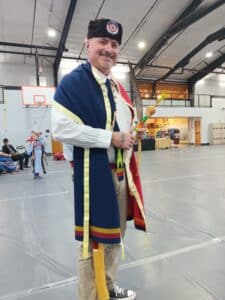The heartbeat of Functional Family Therapy (FFT) lies in the essential relationships that shape the very essence of someone’s character – family. This short term, evidence-based intervention invites loved ones to join therapy sessions to support at-risk youth by improving communication, reducing conflict and building stronger relationships. CREOKS is partnering with tribes such as Shawnee, Peoria, Wyandotte, Quapaw, Cherokee, Seminole and Muscogee Nation to bring FFT into their communities with a focus on culturally responsive practices.
What is Functional Family Therapy?
CREOKS FFT Team Member, Hodalee Sewell customizes family therapy sessions for the tribes to uncover and address the underlying patterns which

Hodalee Sewell at a Quapaw Nation gourd dance.
FFT sessions address issues like substance use, truancy and involvement in the juvenile justice system. Frequently, problems are compounded by societal challenges. “These difficulties stem from deeper relational patterns or community stressors, such as historical trauma, poverty or systemic discrimination,” Sewell explained.
What is the goal of FFT?
Quapaw Nation Juvenile Affairs Case Manager, Tyffanie Hembree emphasizes how FFT welcomes everyone to the table.
“Our primary goal in partnering with CREOKS for FFT is to create a trusted, supportive and collaborative environment for youth and their families—one where they feel seen, heard and empowered.”
The root of conflict is investigated and FFT offers healthier ways of supporting each other, breaking unhelpful habits, using positive reinforcement, maintaining healthy boundaries and relating to each other.
After typically 12-16 weeks with one session per week, the family demonstrates sustainable changes and the skill to manage future conflict. “But the most meaningful signs often come from the family themselves when they express hope, pride and a sense of control over their lives,” Sewell said.
FFT as a Preventative Measure
More than simply addressing current behavioral issues, FFT also strives to prevent:
- Youth involvement in the juvenile justice system
- School dropout or chronic absenteeism
- Substance use and addiction
- Family breakdown or out-of-home placements
- Intergenerational cycles of trauma and violence
With the assistance of the Intertribal Council in Miami, Okla., FFT became more than a clinical model but also a collaborative resource and flexible framework that could easily be integrated into tribal life. Hembree shared, “This partnership is not about fixing anyone—it’s about offering a structured boost through FFT that helps families gain insight into the ‘why’ behind daily behaviors and dynamics.”
By aligning efforts, CREOKS and the tribes empower native families to move forward with renewed clarity and stronger connections.

